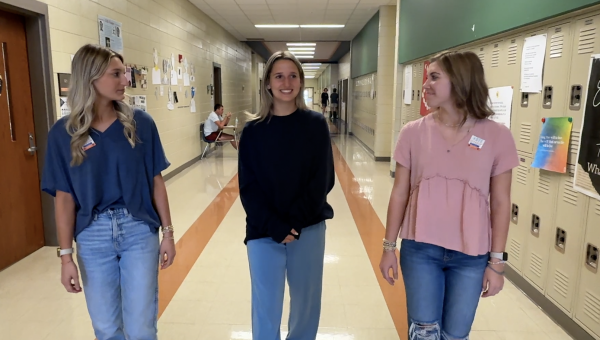New Chapman phone policy proving successful
At the beginning of the 2019-20 school year, Chapman Principal Andrew McMillian implemented a new policy for students: no phones in classrooms.
Since District One has initiated the one-to-one Chromebook policy, administration has encouraged teachers to discourage the use of personal cell phones in the classroom. While teachers can still allow phone use for instructional purposes, most have restricted them. Some teachers have even put up “phone jails” in their classrooms so that students won’t be tempted to check for notifications.
“A lot of the things we do are based on staff feedback,” McMillain said. “Kids are not concentrating, there’s always this urge to check their phones, or they just really can’t focus in class.”
McMillan referenced an article that talked about phantom vibration syndrome, a condition increasingly common among “digital natives” — people who grew up with digital tools — where one feels as though their phone is vibrating even when it’s not. This addiction to phones can be detrimental to students’ work ethic and ability to focus. That’s why McMillan believes this policy is so beneficial: It forces students to pull away from their phones and pay attention to what’s important.
English teacher Caleb Crittendon supports the new policy:
“I feel like we’ve had lots of issues over the last couple years with phones, and the new rule went along with the standards that I was more used to and the standards that I experienced as a student,” Crittendon said.
In the past, phones could be seen as educational tools, but now that every student has their own Chromebook, administration sees no place for phones in a classroom setting.
“With Chromebooks, it’s more project-based, more web-based stuff, more independent stuff in classrooms. If you need your phone to look something up, that means you probably shouldn’t be looking it up because you can just look it up on your Chromebook,” McMillan said.
High school is all about getting prepared for the workplace, and Lisa Highfill, an instructional technology coach at the Pleasanton Unified public and secondary school district in Pleasanton, California, believes that teaching students how to avoid the distraction of their cell phones while working is something that is becoming increasingly important.
“Teach students how to refocus, how to take care of something that is really nagging at them and then move on and put it away,” Highfill said. “Self-monitoring is a lifelong skill that we have an opportunity to integrate into our lessons.”
McMillan agrees with Highfill, and says that this philosophy is the reason behind teacher discretion: If students can prove that they are able to manage their time wisely, then they’ve earned the privilege of using their phones in the classroom. The same goes for time in the hallway and at lunch. Students are able to use their phones until it becomes a problem.
He acknowledges that there are professions that use phones in a productive manner, but students still have to learn how to not allow technology to be a distraction because there’s no “put your phone away” in the workplace; they’ll fire you and hire someone who has the maturity to handle a phone.
“It’s not going away, but you guys have never known anything but the internet… It’s about how you can manage your time and use it as a tool and not a distraction,” McMillan said.
While focus is a big issue when discussing phones, so is behavior. Since the establishment of this policy, the number of behavioral problems and referrals have decreased. Phones previously created an opportunity for drama and conflict, but with the reduced use of phones during the school day, there is substantially less contention between students.
“Classroom management has been much easier because of not having that distraction, especially with my younger students. The issues I used to have to deal with students playing games and getting in conversations with people during class and getting distracted are a lot less frequent,” Crittendon said.
McMillan agrees from an administrative standpoint.
“It’s cut down the discipline from our end to have to go track down kids when they post things they shouldn’t. Now that they don’t have their phones, it’s eliminated a lot of that,” McMillan said.
Both McMillan and Crittendon emphasized that staying really firm about the new policy is key to students respecting and following it.
“I think anytime you implement a new policy you want to be really, really firm from the beginning,” McMillan said.
“Because of the fact that I’ve tried to stay rigid about it, most students have followed the rule. I’ve had a few instances where students have tried to go against it, but it hasn’t been a recurring thing, and I think they’ve mostly gotten used to the new rule,” Crittendon said.
Your donation will support the student journalists of Chapman High School. Your contribution will allow us to purchase equipment and cover our annual website hosting costs.





